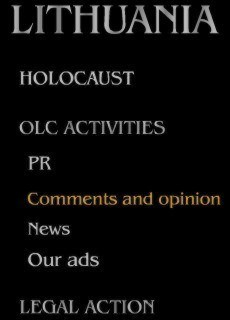| Dr Efraim Zuroff is one of the world's foremost Nazi hunters, as well as a renowned Holocaust historian.
Here, in his first article for talkRADIO, he talks about the widespread refusal to admit the Nazis didn't act alone
This summer and autumn, we mark the 75th anniversary of the beginning of the systematic murder of European Jewry by the Nazis and their local collaborators in the areas which were then part of the Soviet Union.
The murders were carried out individually by shooting, and the names of places like Ponar, Fort IX, Rumbula, and Babi Yar became bywords for Holocaust atrocities.
Although the historical record of these crimes is crystal clear, and the identity of the perpetrators well-known, the new democracies of Eastern Europe are having great difficulties in admitting that it was not only Germans and Austrians who carried out these atrocities, but that their nationals also played an important role in implementing the Final Solution.
During the past fortnight, government-sponsored ceremonies were held in two European capitals to commemorate the mass murders. In Lithuania, the event was held during the country's Holocaust memorial day at Ponar (Paneriai), outside Vilna (Vilnius), where 70,000 Jews were killed by a special Lithuanian mass-murder squad named Ypatingas Burys ("special squad").
In Kiev, the ceremony held at the mass killing site of Babi Yar marked the 75th anniversary of the murder there of approximately 34,000 Jews on September 29-30, 1941, the single largest massacre in the Holocaust up to that point. The massacre was perpetrated by Einsatzkommando 4a, SD and SS police, and local Ukrainian auxiliary police.
As could be expected, the extremely important role played by local Nazi collaborators in the murders in Lithuania and Ukraine wasnt emphasised at any of the memorial events by leaders or government representatives. Ukrainian President Petro Poroshenko did mention at the state ceremony that there were Ukrainian collaborators, but immediately softened the blow by reminding his audience that there were local collaborators in every country occupied by the Nazis and that they "did not represent their people."
In fact, it was only the Jewish representatives - Israeli President Rivlin in his speech to the Ukrainian Rada (Parliament), and Faina Kukliansky, the Chairperson of the Lithuanian Jewish community - who spoke clearly and unequivocally about the participation of local killers in Holocaust crimes.
None of this is surprising to those who have been following the manner in which Holocaust-related issues have been dealt with in post-Communist Eastern Europe, where the narrative of World War II is being rewritten to hide local complicity and promote the canard of equivalency between Communist and Nazi crimes.
Recently, however, at least in Lithuania, there is the beginning of a change, as young, better–educated Lithuanians are seeking to learn the full truth about the Holocaust and have begun to participate voluntarily in Shoa memorial events held in different places throughout the country.
Some 3,000 people marched to mark the murder of the Jews of Moletai in late August, and in response to an initiative on social media by popular Lithuanian author Ruta Vanagaite, many dozens came to Veliucionys, a grossly neglected mass-murder site on the outskirts of Vilna, in late September to mark Lithuania's Holocaust day. Similar ceremonies were held at six other mass-murder sites.
There are, however, a total of 227 mass murder sites all over Lithuania, so it apparently will take quite some time until the truth prevails there, not to mention in the Ukraine, where the situation is much worse in that regard. But at least we are finally seeing the beginning of a positive change, which will hopefully, ultimately ensure the accuracy of the historical narrative of the Holocaust in Eastern Europe.
talkradio.co.uk
| 

